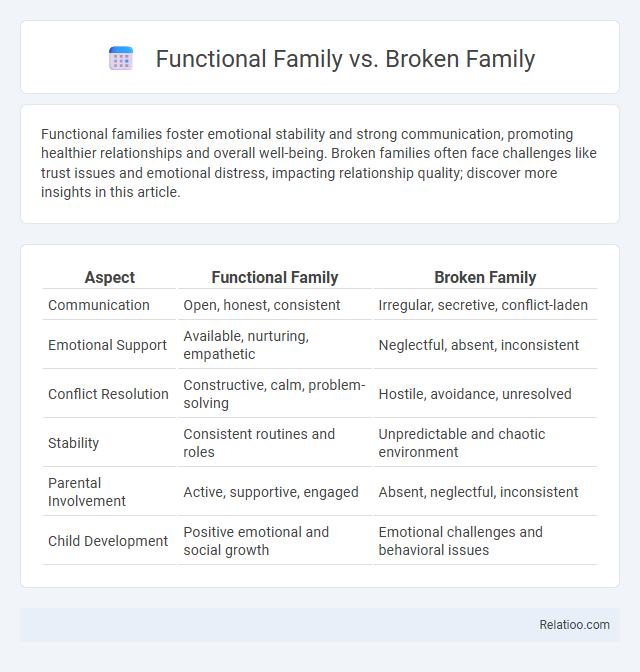Functional families foster emotional stability and strong communication, promoting healthier relationships and overall well-being. Broken families often face challenges like trust issues and emotional distress, impacting relationship quality; discover more insights in this article.
Table of Comparison
| Aspect | Functional Family | Broken Family |
|---|---|---|
| Communication | Open, honest, consistent | Irregular, secretive, conflict-laden |
| Emotional Support | Available, nurturing, empathetic | Neglectful, absent, inconsistent |
| Conflict Resolution | Constructive, calm, problem-solving | Hostile, avoidance, unresolved |
| Stability | Consistent routines and roles | Unpredictable and chaotic environment |
| Parental Involvement | Active, supportive, engaged | Absent, neglectful, inconsistent |
| Child Development | Positive emotional and social growth | Emotional challenges and behavioral issues |
Defining Functional Families: Key Characteristics
Functional families demonstrate effective communication, emotional support, and collaborative problem-solving, creating a stable environment for personal growth. In these families, You find clear boundaries, mutual respect, and consistent nurturing behaviors that promote resilience and healthy relationships. Unlike broken families, functional families maintain cohesion and adaptability, ensuring members feel valued and secure.
Identifying Broken Families: Common Signs
Identifying a broken family involves recognizing common signs such as poor communication, constant conflict, and lack of emotional support among members. Dysfunctional patterns often manifest in trust issues, neglect, and inconsistent parenting, which negatively impact children's emotional development. Understanding these markers helps you address problems early and work towards creating a more functional family environment.
Communication Patterns in Functional vs Broken Families
Functional families exhibit open, respectful communication patterns that foster trust and emotional support, enabling family members to express feelings and resolve conflicts effectively. Broken families often display inconsistent, unclear, or hostile communication, leading to misunderstandings, emotional distance, and unresolved conflicts. Your ability to develop healthy communication habits is greatly influenced by the family environment in which you were raised, highlighting the importance of functional family dynamics.
Emotional Support and Stability
Emotional support and stability are crucial in a functional family, where open communication and consistent care foster a secure environment for Your growth and well-being. Broken families often struggle with emotional neglect and instability, leading to increased stress and uncertainty for members. Comparing the two, a functional family promotes resilience and healthy relationships, while broken families may require external support to regain emotional balance and stability.
Conflict Resolution Approaches
Functional families employ effective conflict resolution approaches such as open communication, active listening, and collaborative problem-solving, fostering emotional support and trust among members. Broken families often struggle with unresolved conflicts, neglect, and poor communication patterns, leading to increased stress, resentment, and emotional distance. Your understanding of these contrasting approaches can help improve relationships by promoting healthier conflict resolution strategies within your family dynamics.
Parental Roles and Responsibilities
Parental roles and responsibilities in a functional family emphasize consistent support, clear communication, and shared decision-making, fostering a stable environment for children's emotional and social development. In contrast, broken families often experience disrupted parental roles due to separation or conflict, resulting in inconsistent guidance and emotional challenges for children. Functional blended families integrate distinct parental roles through cooperation and mutual respect, ensuring children's well-being despite complex family dynamics.
Impact on Child Development
Children raised in functional families typically exhibit better emotional stability, social skills, and academic performance due to consistent support, effective communication, and healthy boundaries. In contrast, children from broken families often face increased risks of behavioral problems, anxiety, and lower self-esteem stemming from family disruption, inconsistent parenting, and emotional distress. The distinction between functional and broken families significantly influences children's cognitive development, coping mechanisms, and future relationship patterns.
Effects on Mental Health and Well-being
Functional families foster emotional stability, effective communication, and strong support systems that contribute positively to your mental health and overall well-being. Broken families often experience higher levels of stress, anxiety, and emotional distress, increasing the risk of mental health disorders such as depression and behavioral problems. Understanding the differences between these family dynamics allows you to seek healthier relationships and coping strategies that promote resilience and psychological growth.
Strategies to Strengthen Family Functionality
Building strong communication skills and fostering trust are essential strategies to enhance family functionality, whether overcoming challenges in broken families or maintaining harmony in functional families. You can implement consistent routines and encourage emotional support to create a stable, nurturing environment that promotes resilience and healthy relationships. Prioritizing conflict resolution techniques and collaborative problem-solving further strengthens family bonds and sustains long-term functionality.
Building Resilience in Challenging Family Environments
Building resilience in challenging family environments requires understanding the dynamics between functional and broken families. Functional families provide emotional support, clear communication, and stability, which foster coping skills and adaptability, while broken families often face instability and conflict that can hinder emotional growth. Your ability to develop resilience hinges on recognizing these patterns and seeking healthier interactions that promote healing and strength.

Infographic: Functional Family vs Broken Family
 relatioo.com
relatioo.com